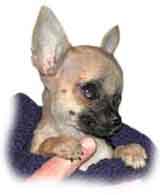Small Dog BreedsInformation About The Lowchen Dog Breed |
|
|
The Lowchen is a member of the Bichon family and shares the title of "the little lion dog" with the imperial Pekingese. He has been well known and popular in Europe for several centuries. The little lion dog came from the practice of clipping the breed in the traditional poodle exhibition cut, the lion clip, which, complete with mane and tufted tail, gives him the look of a miniature lion. Though he may appear to be delicate, the Lowchen is a robust dog that is full of energy. He is an affectionate, intelligent, healthy small dog with a happy disposition and makes for a good show dog. Size: A healthy adult Lowchen stands at about 10-13in and weighs between 4-9lb. History: This breed is believed to be a French dog. He is registered with the FCI as of native origin under the title "petit chien lion." He has definitely been well known in both France and Spain from the late 1500s and is believed to have been a favorite by the charming Duchess of Alba. In fact, a dog that possesses a strong similarity to the Lowchen appears in a portrait of the Duchess painted by the Spanish artist Francisco Goya (1746-1828). The Lowchen was said to have evolved in the Mediterranean area about the same time as the Bichon Frise, the Bichon Bolognese, and the Maltese. Nowadays, this breed is steadily becoming a frequent contender in the show ring in many countries. Feeding: Recommended feeding for the Lowchen is 1/3 -1/2 can of high quality meat product (13.30z size) with added biscuit of equal amount in volume or 1-1 ½ cupfuls of a complete dry food. Just like all breeds, make sure that he is getting unlimited supply of drinking water. Exercise: This breed is suitable for country as well as town living. He requires regular exercise such as a brisk walk or a good run in the park. Grooming: Daily brushing is necessary in order to maintain the breed's coat in good condition. Most owners prefer to take this dog to a professional groomer to get the ideal clipping, especially for show dogs.Back to the Small Dog Breed page
| |
|
Related News About Dogs ' ); // get rid of newsfeed display by carp CarpConf('poweredby',''); CarpCacheShow('http://www.small-dog-info.com/support-files/rss.xml'); ?>
|
|
|
|
|
|
Copyright © 2006-2007 dogguidance.com |


